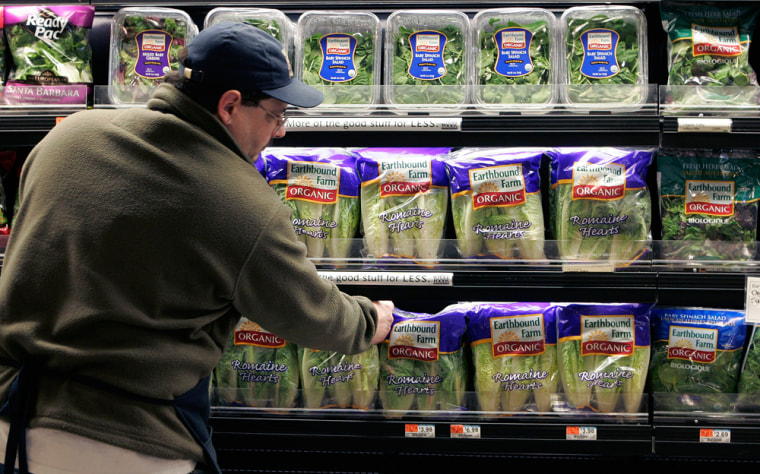September’s national spinach recall has shaken consumer confidence in the safety of leafy green vegetables, according to a new national survey.
Consumers are still avoiding greens and questioning safety issues, months after spinach contaminated with E. coli bacteria killed three people and sickened nearly 200.
Plummeting spinach sales have also prompted the produce industry to seek federal oversight to assure buyers that fresh produce is safe.
“We need to be in front of this to maintain consumer confidence,” said Tom Stenzel, president of the United Fresh Produce Association, a leading trade group. “Consumers need to eat fresh produce and feel safe in their choices,” he said.
A new national survey to be released Monday by Rutgers University suggests that the broad recall could have lasting effects on spinach and other similar vegetables. As a result, consumers felt uncertain and threw away other bagged produce that was not affected by the recall.
William K. Hallman, director of the Food Policy Institute at Rutgers, called the September spinach recall — and the E. coli contamination at Taco Bells on the East Coast three months later — a “signal event” in the public’s perception of food safety.
“Consumers’ expectations were violated by the fact that a product they thought was clean and wholesome turned out to be something they did not expect,” he said. “It raises questions about other produce that are grown in the same way.”
The survey showed nearly 9 out of 10 consumers said they heard about the recall, but nearly 1 in 3 said they didn’t know the recall was over when the survey was taken. About 1 in 5 who were aware of the recall also stopped eating other bagged produce, and 7 percent threw out fresh produce other than spinach during the recall. More than 75 percent of respondents with spinach in their home threw it out.
More than half of the people who ate spinach prior to the recall hadn’t returned to eating it when the survey was taken.
Uncertainty generated by the inability to quickly pinpoint the source of the contamination and the broad nature of the recall caused confusion, Hallman said.
“This has caused people to take a step back and think about what they’re eating in terms of produce, more generally than just spinach, and where it comes from,” he said.
The national telephone survey of 1,200 people was conducted over three weeks in November, more than six weeks after the spinach recall but before the Taco Bell outbreak. The sampling margin of error was plus or minus 3 percentage points.
Some consumers like Anna Blanco have yet to buy spinach or bagged salads since the recall. Before the outbreak, she bought spinach once a week.
“You don’t know if it’s going to happen again,” said Blanco, 62, as she shopped at a Whole Foods store in West Orange, N.J. “I don’t buy anything bagged. I can get other vegetables, carrots or broccoli.”
Kristina DiGiglio began buying spinach again within the last month. The 28-year-old graphic designer said she waited so long because she wanted to feel confident about safety and was nervous before.
“I wanted to make sure it was all clear,” she said.
Sales figures through Dec. 23 from 16,000 conventional supermarkets, not including big-box stores such as Wal-Mart or Costco, showed an overall 14 percent drop in spinach sales from a year ago, according to the Perishables Group. Bulk spinach dropped by nearly half and even packaged salad without spinach dropped about 10 percent.
“The spinach contamination may have had a spillover effect to other produce items,” said Ed Mackowiak, vice president of sales for FreshLook Marketing. His company’s survey of 17,000 grocery stores, not including Wal-Mart or Costco, showed a nearly 17 percent drop in sales of bulk and bagged spinach for 2006 as compared to a year ago.
One explanation for the drop is limited supply, depleted after the recall, said Steve Lutz, executive vice president of the Perishables Group.
Consumer preference for spinach-free salads led Pacific International Marketing to stop growing and selling the baby spinach it used to put into salad mixes, said Tom Russell, president of the grower and shipper of leafy green vegetables in Salinas, Calif.
Sales of salad mix took a roughly 50 percent hit after the September E. coli outbreak, and the mix is now selling only about 75 percent as well as it had been, he said. Sales of conventionally grown bunched spinach are about 80 percent what they were before the September outbreak, he said.
“There’s still a lingering hangover,” Russell said.
The industry is seeking new federal regulations that would oversee produce handling and production, said Stenzel, of the produce association.
“We’re asking for uniform national standards across all growing regions with a compliance measurement implemented by government that assures public trust,” he said. “We need to do this on a forward basis, not just after something goes wrong.”
David Acheson, chief medical officer for food safety at the Food and Drug Administration, said he’s unsure what federal regulations would look like.
“We’re going to have to up the ante a little bit, but it’s not quite clear what that will be,” he said. “At the end of the day, we don’t want people getting sick.”
